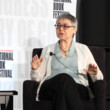Dept. of Speculation
(Libby/OverDrive eBook, Kindle)
Available Platforms
Description
Excerpt
Similar Titles From NoveList
Similar Authors From NoveList
Published Reviews
Booklist Review
This is a magnetic novel about a marriage of giddy bliss and stratospheric anxiety, bedrock alliance and wrenching tectonic shifts. Offill, author of the novel Last Things (1999) and various children's books, covers this shifting terrain and its stormy weather in an exquisitely fine-tuned, journal-like account narrated by the wife, an ironic self-designation rooted in her growing fears about her marital state. She is smart if a bit drifty, imaginative and selectively observant, and so precisely articulate that her perfect, simple sentences vibrate like violin strings. And she is mordantly funny, a wry taxonomist of emotions and relationships. Her dispatches from the fog of new motherhood are hilarious and subversive. Her cynical pursuit of self-improvement is painfully accurate. Her Richter-scale analysis of the aftershocks of infidelity is gripping. Nothing depicted in this portrait of a family in quiet disarray is unfamiliar in life or in literature, and that is the artistic magic of Offill's stunning performance. She has sliced life thin enough for a microscope slide and magnified it until it fills the mind's eye and the heart.--Seaman, Donna Copyright 2010 Booklist
Publisher's Weekly Review
Popping prose and touching vignettes of marriage and motherhood fill Offill's (Last Things) slim second book of fiction. Clever, subtle, and rife with strokes of beauty, this book is both readable in a single sitting and far ranging in the emotions it raises. The 46 short chapters are told mostly in brief fragments and fly through the life of the nameless heroine. Her mind wanders from everyday tasks and struggles, the beginnings of her marriage, the highs and lows with her husband, the joys of having a daughter. These domestic bits are contrasted by far-flung thoughts that whirl in every direction, from space aviation and sea exploration to ancient philosophy and Lynyrd Skynyrd lyrics. Anecdotes and quotes also come from all over: Einstein, Eliot, Keats, Rilke, Wittgenstein, Darwin, and Carl Sagan. Often, the use of third person places the heroine at a distance, examining the macro-reality of her life, but then Offill will zoom in, giving the reader a view into her heroine's inner life-notes, graded papers and corrected manuscripts, monologues, imagined Christmas cards and questionnaires. Offill has equal parts cleverness and erudition, but it's her language and eye for detail that make this a must-read: "Just after she turns five my daughter starts making confessions to me. It seems she is noticing her thoughts as thoughts for the first time and wants absolution.... I thought of stepping on her foot, but I didn't. I tried to make her a little bit jealous. I pretended to be mad at him. 'Everybody has bad thoughts,' I tell her. 'Just try not to act on them.' " (Jan.) (c) Copyright PWxyz, LLC. All rights reserved.
Library Journal Review
At first, the fragmentary nature of this second novel by Offill (Last Things) makes it difficult to fit the pieces into a whole. As the work progresses, however, listeners are presented with the story of a marriage, of motherhood, and of trying to write the elusive second novel. The unnamed wife, whose tale this is, weaves the narrative fragments into an eventually moving and compelling portrait of her life in Brooklyn, a life in which she must attempt to balance her roles as spouse, mother, and author while keeping herself whole. Not all authors read their own work well, but Offill does so here in a nuanced performance that helps the listener keep track of the narrative fragments. VERDICT Highly recommended. ["Offill's lean prose and the addition of astute quotations prevent the text from becoming just one more story of an infidelity. Her writing is exquisitely honed and vibrant," read the review of the Knopf hc, LJ 11/1/13.]-Wendy Galgan, St. Francis Coll., Brooklyn (c) Copyright 2014. Library Journals LLC, a wholly owned subsidiary of Media Source, Inc. No redistribution permitted.
Kirkus Book Review
Scenes from a marriage, sometimes lyrical, sometimes philosophically rich, sometimes just puzzling. If Rainer Maria Rilke had written a novel about marriage, it might look something like this: a series of paragraphs, seldom exceeding more than a dozen lines, sometimes without much apparent connection to the text on either side. The story is most European, too; says the narrator, "I spent my afternoons in a city park, pretending to read Horace. At dusk, people streamed out of the Mtro and into the street. In Paris, even the subways are required to be beautiful." Well, oui. The principal character is "the wife," nameless but not faceless, who enters into a relationship and then marriage with all the brave hope attendant in the enterprise. Offill (Last Things, 1999, etc.) is fond of pointed apothegms ("Life equals structure plus activity") and reflections in the place of actual action, but as the story progresses, it's clear that events test that hope--to say nothing of hubby's refusal at first to pull down a decent salary, so the young family finds itself "running low on money for diapers and beer and potato chips." Material conditions improve, but that hope gets whittled away further with the years, leading to moments worthy of a postmodern version of Diary of a Mad Housewife: "The wife is reading Civilization and Its Discontents, but she keeps getting lost in the index." The fragmented story, true though it may be to our splintered, too busy lives, is sometimes hard to follow, and at times, the writing is precious, even if we're always pulled back into gritty reality: "I reach my hand into the murky water, fiddle with the drain. When I pull it back out, my hand is scummed with grease." There are moments of literary experimentation worthy of Virginia Woolf here, but in the end, this reads more like notes for a novel than a novel itself.]] Copyright Kirkus Reviews, used with permission.
Booklist Reviews
This is a magnetic novel about a marriage of giddy bliss and stratospheric anxiety, bedrock alliance and wrenching tectonic shifts. Offill, author of the novel Last Things (1999) and various children's books, covers this shifting terrain and its stormy weather in an exquisitely fine-tuned, journal-like account narrated by "the wife," an ironic self-designation rooted in her growing fears about her marital state. She is smart if a bit drifty, imaginative and selectively observant, and so precisely articulate that her perfect, simple sentences vibrate like violin strings. And she is mordantly funny, a wry taxonomist of emotions and relationships. Her dispatches from the fog of new motherhood are hilarious and subversive. Her cynical pursuit of self-improvement is painfully accurate. Her Richter-scale analysis of the aftershocks of infidelity is gripping. Nothing depicted in this portrait of a family in quiet disarray is unfamiliar in life or in literature, and that is the artistic magic of Offill's stunning performance. She has sliced life thin enough for a microscope slide and magnified it until it fills the mind's eye and the heart. Copyright 2014 Booklist Reviews.
Library Journal Reviews
The book's title refers to the return address used by both husband and wife on letters they wrote to each other while dating. This slim novel continually speculates on the marriage of our unnamed protagonist, through all its vagaries, including the husband's affair with a much younger woman. Everyday events are always related from the wife's point of view. She is a writing instructor at a college in New York City and is also helping to write a book for a "would-be astronaut" about space travel. As the woman moves through the phases of her eagerly anticipated marriage to an Ohio-born musician, from its beginning through motherhood and more, the reader easily empathizes with her struggles and frustrations. The narrative changes direction near the end, when our heroine attempts to keep her soul together along with her marriage and family. VERDICT This work reads very quickly, and a second read is recommended. Offill's lean prose and the addition of astute quotations prevent the text from becoming just one more story of an infidelity. The author's debut, Last Things, was a Los Angeles Times First Book Award finalist, noted by the New York Times; here, her writing is exquisitely honed and vibrant. This would be an enlightened choice for a reading group. [See Prepub Alert, 7/8/13.]—Lisa Rohrbaugh, Leetonia Community P.L., OH
[Page 81]. (c) Copyright 2013. Library Journals LLC, a wholly owned subsidiary of Media Source, Inc. No redistribution permitted.Publishers Weekly Reviews
Popping prose and touching vignettes of marriage and motherhood fill Offill's (Last Things) slim second book of fiction. Clever, subtle, and rife with strokes of beauty, this book is both readable in a single sitting and far ranging in the emotions it raises. The 46 short chapters are told mostly in brief fragments and fly through the life of the nameless heroine. Her mind wanders from everyday tasks and struggles, the beginnings of her marriage, the highs and lows with her husband, the joys of having a daughter. These domestic bits are contrasted by far-flung thoughts that whirl in every direction, from space aviation and sea exploration to ancient philosophy and Lynyrd Skynyrd lyrics. Anecdotes and quotes also come from all over: Einstein, Eliot, Keats, Rilke, Wittgenstein, Darwin, and Carl Sagan. Often, the use of third person places the heroine at a distance, examining the macro-reality of her life, but then Offill will zoom in, giving the reader a view into her heroine's inner life—notes, graded papers and corrected manuscripts, monologues, imagined Christmas cards and questionnaires. Offill has equal parts cleverness and erudition, but it's her language and eye for detail that make this a must-read: "Just after she turns five my daughter starts making confessions to me. It seems she is noticing her thoughts as thoughts for the first time and wants absolution.... I thought of stepping on her foot, but I didn't. I tried to make her a little bit jealous. I pretended to be mad at him. ‘Everybody has bad thoughts,' I tell her. ‘Just try not to act on them.' " (Jan.)
[Page ]. Copyright 2013 PWxyz LLCReviews from GoodReads
Citations
Offill, J. (2014). Dept. of Speculation . Knopf Doubleday Publishing Group.
Chicago / Turabian - Author Date Citation, 17th Edition (style guide)Offill, Jenny. 2014. Dept. of Speculation. Knopf Doubleday Publishing Group.
Chicago / Turabian - Humanities (Notes and Bibliography) Citation, 17th Edition (style guide)Offill, Jenny. Dept. of Speculation Knopf Doubleday Publishing Group, 2014.
Harvard Citation (style guide)Offill, J. (2014). Dept. of speculation. Knopf Doubleday Publishing Group.
MLA Citation, 9th Edition (style guide)Offill, Jenny. Dept. of Speculation Knopf Doubleday Publishing Group, 2014.
Copy Details
| Collection | Owned | Available | Number of Holds |
|---|---|---|---|
| Libby | 5 | 5 | 0 |






































